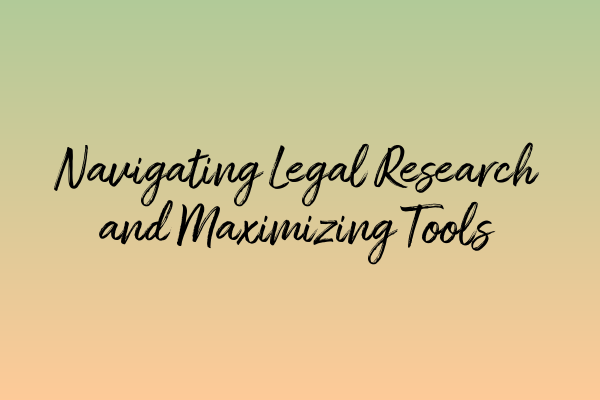Navigating Legal Research and Maximizing Tools
Legal research is a fundamental aspect of the solicitor’s work. It involves gathering, analyzing, and interpreting legal information to support legal arguments, provide advice, and make informed decisions. In today’s digital age, the abundance of online resources and tools has revolutionized the way legal research is conducted. This blog post will explore effective strategies for navigating legal research and maximizing the use of tools to enhance your practice.
1. Understanding the Basics
Before diving into the world of legal research, it’s essential to have a solid understanding of the case law, statutes, regulations, and other primary and secondary legal sources relevant to your practice area. Familiarize yourself with legal terminology and concepts by referring to authoritative legal dictionaries and textbooks. Keep updated with changes in legislation and legal precedents by following legal news websites and attending relevant seminars or conferences.
Related Articles:
Magistrates’ Court vs Crown Court: Different Paths in Criminal Proceedings
2. Utilizing Online Legal Databases
Online legal databases are a treasure trove for solicitors, offering a vast collection of legal resources, including case law, legislation, legal journals, and commentary. Some popular legal databases include LexisNexis, Westlaw, and HeinOnline. Take advantage of the advanced search features provided by these platforms to refine your research and save time. Use keywords, phrases, and Boolean operators to narrow down your search results and locate relevant materials.
Related Articles:
Private Prosecutions: Exploring Non-Governmental Prosecutions in Criminal Cases
Ethical Challenges in Criminal Defence: Navigating Dilemmas
Understanding Drug-related Offences: Laws and Penalties in the UK
3. Harnessing Artificial Intelligence
As technology continues to advance, artificial intelligence (AI) is making its mark in the legal field. AI-powered research tools can help streamline legal research by analyzing vast amounts of data, identifying patterns, and providing predictive insights. These tools can save solicitors significant time and improve the accuracy of their legal research. Examples of AI-powered legal research tools include Casetext, ROSS Intelligence, and Fastcase.
4. Collaborating with Colleagues
Legal research doesn’t have to be a solitary endeavor. Collaborating with colleagues, both within your firm and across the legal community, can enrich your research experience. Seek input from experienced solicitors or engage in legal research discussion forums to exchange ideas, share resources, and clarify legal concepts. Through collaboration, you can gain valuable insights, access additional resources, and broaden your understanding of complex legal issues.
5. Verifying and Cross-Referencing
While online resources are valuable, they should be used with caution. Verify the accuracy and currency of the information you find by cross-referencing multiple sources. Different databases or platforms may contain varying interpretations or updates on the law. Always rely on reputable and authoritative sources to ensure the reliability of your research.
6. Documenting Your Research
Keeping organized records of your research findings is essential for effective legal practice. Create a system to document and store your research notes, citations, and relevant excerpts from legal sources. This can help you track your research progress, maintain a reference library, and easily retrieve materials when needed in the future.
Conclusion
Navigating legal research requires a combination of knowledge, technology, collaboration, and critical thinking. By understanding the basics, utilizing online databases, harnessing AI tools, collaborating with colleagues, verifying information, and documenting your research, you can maximize the efficiency and effectiveness of your legal research practice.
Related Article:
Criminal Defence Strategies: Expert Approaches to Protecting Clients’ Interests


Leave a Reply